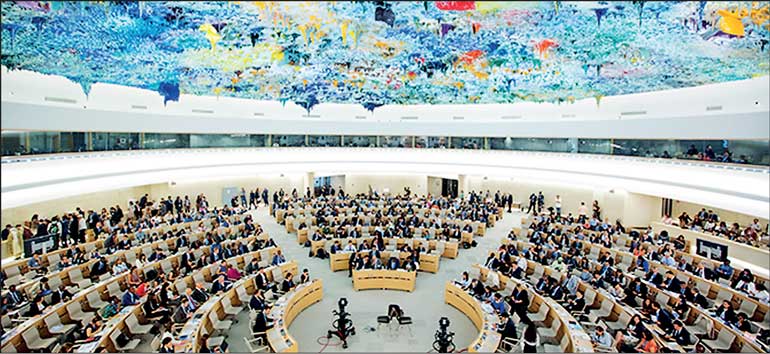Wednesday Feb 18, 2026
Wednesday Feb 18, 2026
Friday, 16 September 2022 00:00 - - {{hitsCtrl.values.hits}}

TOUGH POISE – in purely psychological terms, it’s a pose to conceal insecurity; introduce the paradigm of politics into the stance, and it becomes a position that’s violated with impunity
 A funny thing happened on the way to the forum. Sri Lanka’s Government grew a strong spine. And rather than resting on its fanny comfortably, it exercised its tushy gymnastically. Or in colloquial Swiss French: “le more ze derriere!”
A funny thing happened on the way to the forum. Sri Lanka’s Government grew a strong spine. And rather than resting on its fanny comfortably, it exercised its tushy gymnastically. Or in colloquial Swiss French: “le more ze derriere!”
To claim the country’s constitution as one’s ‘bible’ or ‘bhagavadgita’ is laudable. It smacks of our stalwart governors sticking to their sterling guns in the face of hostile fire.
But to ward off egregious international intervention in domestic matters on the grounds of our sovereignty is one thing.
To treat this solid ground – inviolable constitutionalism – as a firm place to stand abroad, while our foreign minister moves the earth (to stand the sun still to leverage peace from enemy quarters and bless our homeland?), is yet another.
To realise it is shifting sand at home – our past coups, present pointedly self-interested constitutional amendments, looking for future loopholes, legalism trumping legitimacy, and all that jazz – is quite a different proposition altogether.
With that said – the argument that #Geneva’s right to rummage in our underwear drawer is ultra vires our constitution bears clearer inspection.
Also in the running for closer scrutiny is the charge we have essayed in angered response that the UN Human Rights Council is trespassing beyond its ambit in its attempts to impose ‘economic sanctions’ on Sri Lanka.
That these are not universal embargos and over-reaching punitive measures, but rather selective and targeted, has escaped our attention for momentary convenience.
There are at least three views on the Sri Lankan government’s present position and stance:
Arrogant
A first is based on the canny stratagem that ‘attack is the best form of self-defence’.
It is a point of view that has drawn howls of protest from liberals et al., who have waxed indignant on the brassy boldness – some would say bravado – of the administration presently at the helm... an indignation that makes the critics of the regime acronymous, as much as acrimonious!
“Why can’t the GOSL learn better to mind its Ps and Qs when so much more than GSP+ and the abolition of the PTA are riding on the outcome of the UNHRC this time around?”
Such inchoate idealism fails to realise what battle-hardened veterans in the martial theatre of international politics know... that there is an often indistinguishable difference between courage under fire and the punch-drunk foolhardiness of traumatised combatants.
So what appears to be clenched-fist arrogance in the face of an implacable enemy – as our critics at the forum and movers of resolutions on/for/with must seem to some of us – is merely the affright of consequences to be faced... if punitive measures follow any admission of guilt.
And this time round, the MP who confessed on behalf of his political masters in parliament that ‘mistakes were made’ in terms of domestic policy is admitting no such thing for international consumption in his role as FM.
If the eloquent and no doubt erudite minister-ambassador is counting on appeals to constitutionalism resonating with the legalism of the western mind, he may well be counting his chickens before they are hatched?
Point taken – as a fresh draft resolution urges the Office of the High Commissioner for Human Rights (OHCHR) to step up its monitoring and reporting on the human rights status quo in Sri Lanka, among other modalities...
Is this not a step Sri Lanka could have taken itself? Sans obnoxious provocation from anyone overseas and in the face of obvious pressure from millions of protestors at home? Is yet another administration finding it too hard a task to read the room – or esplanade – right?
Ergo, another resolution urging a society that has failed to beat its swords into ploughshares to consider its errant ways could have been pre-empted had we summoned the grace and humility to slip off the saddles of those high horses we call ‘sovereignty’ and ‘state security’.
Not to look in the face the gift horse of nation states standing in Sri Lanka’s corner in Geneva. But their own track records in regard to human rights and the rule of law bear some reflection.
And we would do well not to rest on the laurels on what seems like a reprieve when consternation with the hypocrisy of the global north is interpreted as an endorsement of failed states in the global south.
Apathetic
An inevitable second is the contrapuntal movement militating in favour of defensiveness popular among nationalists.
It speaks to the delaying tactic of ‘any port in a storm’.
For example, to field a fiery foreign minister with eloquent exceptions to civilisational norms on his lips – in the hope that the law-loving legalism of the west would find a little island-nation’s hopeful appeal to constitutionalism elegant!
Of course, the long-term problem with such trench warfare is that the ‘any foxhole under fire’ defence is this... long after you’ve grown cold, muddy, and miserable cowering at the bottom of a flooded pit of outrage at what seem like undeserved attacks mixed with self-pity at the state of your nation, the barrage overhead will still be there.
Next year... and the year after that... ad infinitum!
So it isn’t helpful to recast our past promises to the international community – such as imposing a moratorium on deploying the PTA, or the full and expeditious implementation of the 13th Amendment – as so much water under the bridge.
Or characterise our ongoing failure to honour other possible undertakings – such as being open to a hybrid mechanism to fast-track transitional justice – as impossible to honour or accept now. Simply because of a putative affront to our constitution.
Is it too much, then, to prompt such an antagonistic state to institute a fully-home-grown mechanism of its own, even now? Or begin to action some of the recommendations in two keystone findings – the Udalagama and Parangama Commissions’ reports, which have already done the vital spadework?
Ergo, the UN Core Group exhortation to GOSL to ‘re-energise’ instruments such as the Office of Missing Persons (OMP) and the Office for Reparations (OR).
Or must our apathy to being a member of the tribe of civilised modern nation states descend from the sublime (‘We must protect our constitution’) to the ridiculous (‘If it means ignoring key elements of the social contract, so be it – and shame be on him or her who thinks evil of it’)?
Absurd
The third is a cynical perspective that permits dispassionate observers to take a ‘long-term, long-game’ approach.
It suspects that our international interlocutors will soon enough grow weary with their persistence in trying to teach a raft of savages the value of treating every shipwrecked refugee alike.
After all, they may reason, Geneva is an annual event. The freak show will move from the global spotlight to backwater European caucuses sooner than later. That pesky set of unforgiving lobbyists will have eleven months to make their case, shake the heavens, and move the earth again...
Next year, we can canter into the fray with panoplies of fresh excuses or fatuous exceptions.
Perhaps a now-almost-inevitable general election could serve to persuade our challengers then that democracy being restored to the republic through a renewed mandate holds out hope that justice – transitional and/or other types – will (finally!) be served?
It might even stretch as far as the presidential polls. Whereby it could be argued that in order to safeguard Sri Lanka’s national interests, it is crucial to let the caretaker president serve out his term to ensure a modicum of political stability.
Would it be absurd to counter-argue? That the ascension to office of the incumbent chief executive rests on the backs of the largest, most significant expression of citizen dissent to date? At a regime that is evidently still in situ?
Should we – as in GOSL in general and Sri Lanka at large, as represented by a regime that is not representative of the republic’s true political temperature at this time – choose to ignore the people’s will now? As we ignored the injustices to some of our citizens then, it will not bode well for our survival, subsequent recovery and hopefully eventual thriving.
As for its arrogance, government may do well to shelve its tendency to refer to resounding mandates in the past. There is an Aragalaya and an Antharaya to seriously challenge any notion of an ongoing green light from that now-invisible or largely silent majority.
In terms of its apathy, time to get serious about parliament dissolving itself (which it could do by March 2023)... and/or the president shake off the shackles of a shelved set of spectres and fast-track the much-needed reforms processes – including new high roads to transitional justice.
Last but by no means least, the absurdity of burgeoning defence spending and the increasing – not decreasing – militarisation of civilian spaces, including the tendency of latter-day Caesarism to dictate terms to all branches of government, must end in haste.
And as much as we can no longer afford to postpone the intentional transformation of our polity from a post-war to a post-conflict society, we must also do everything possible to pre-empt the Geneva Syndrome from taking our peace of mind hostage at this time, next year...
| Editor-at-large of LMD |